大学英语教研室2019暑期工作安排
- 格式:doc
- 大小:38.50 KB
- 文档页数:3
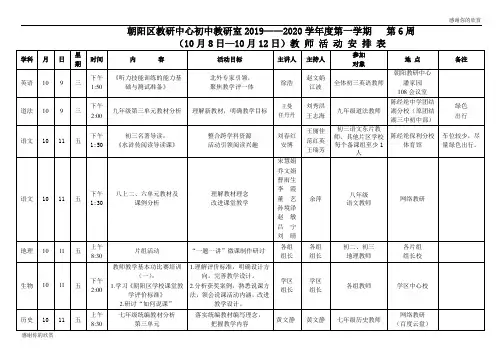
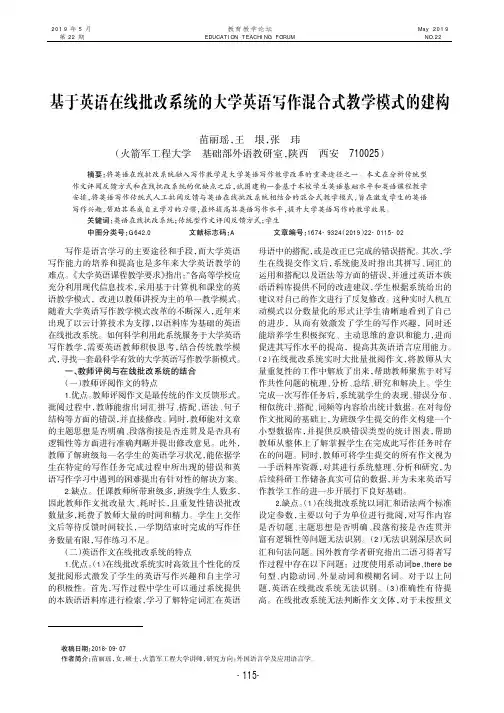
基于英语在线批改系统的大学英语写作混合式教学模式的建构收稿日期:2018-09-07作者简介:苗丽瑶,女,硕士,火箭军工程大学讲师,研究方向:外国语言学及应用语言学。
写作是语言学习的主要途径和手段,而大学英语写作能力的培养和提高也是多年来大学英语教学的难点。
《大学英语课程教学要求》指出:“各高等学校应充分利用现代信息技术,采用基于计算机和课堂的英语教学模式,改进以教师讲授为主的单一教学模式。
随着大学英语写作教学模式改革的不断深入,近年来出现了以云计算技术为支撑,以语料库为基础的英语在线批改系统。
如何科学利用此系统服务于大学英语写作教学,需要英语教师积极思考,结合传统教学模式,寻找一套最科学有效的大学英语写作教学新模式。
一、教师评阅与在线批改系统的结合(一)教师评阅作文的特点1.优点。
教师评阅作文是最传统的作文反馈形式。
批阅过程中,教师能指出词汇拼写、搭配、语法、句子结构等方面的错误,并直接修改。
同时,教师能对文章的主题思想是否明确、段落衔接是否连贯及是否具有逻辑性等方面进行准确判断并提出修改意见。
此外,教师了解班级每一名学生的英语学习状况,能依据学生在特定的写作任务完成过程中所出现的错误和英语写作学习中遇到的困难提出有针对性的解决方案。
2.缺点。
任课教师所带班级多,班级学生人数多,因此教师作文批改量大、耗时长,且重复性错误批改数量多,耗费了教师大量的时间和精力。
学生上交作文后等待反馈时间较长,一学期结束时完成的写作任务数量有限,写作练习不足。
(二)英语作文在线批改系统的特点1.优点。
(1)在线批改系统实时高效且个性化的反复批阅形式激发了学生的英语写作兴趣和自主学习的积极性。
首先,写作过程中学生可以通过系统提供的本族语语料库进行检索,学习了解特定词汇在英语母语中的搭配,或是改正已完成的错误搭配。
其次,学生在线提交作文后,系统能及时指出其拼写、词汇的运用和搭配以及语法等方面的错误,并通过英语本族语语料库提供不同的改进建议,学生根据系统给出的建议对自己的作文进行了反复修改。
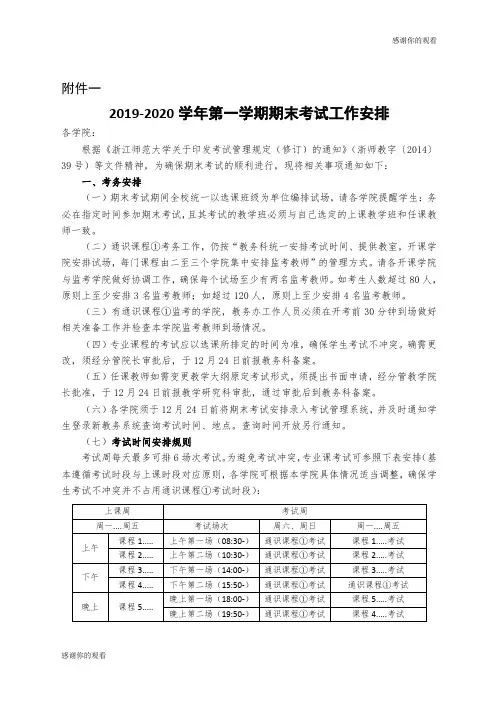
附件一2019-2020学年第一学期期末考试工作安排各学院:根据《浙江师范大学关于印发考试管理规定(修订)的通知》(浙师教字〔2014〕39号)等文件精神,为确保期末考试的顺利进行,现将相关事项通知如下:一、考务安排(一)期末考试期间全校统一以选课班级为单位编排试场,请各学院提醒学生:务必在指定时间参加期末考试,且其考试的教学班必须与自己选定的上课教学班和任课教师一致。
(二)通识课程①考务工作,仍按“教务科统一安排考试时间、提供教室,开课学院安排试场,每门课程由二至三个学院集中安排监考教师”的管理方式。
请各开课学院与监考学院做好协调工作,确保每个试场至少有两名监考教师。
如考生人数超过80人,原则上至少安排3名监考教师;如超过120人,原则上至少安排4名监考教师。
(三)有通识课程①监考的学院,教务办工作人员必须在开考前30分钟到场做好相关准备工作并检查本学院监考教师到场情况。
(四)专业课程的考试应以选课所排定的时间为准,确保学生考试不冲突。
确需更改,须经分管院长审批后,于12月24日前报教务科备案。
(五)任课教师如需变更教学大纲原定考试形式,须提出书面申请,经分管教学院长批准,于12月24日前报教学研究科审批,通过审批后到教务科备案。
(六)各学院须于12月24日前将期末考试安排录入考试管理系统,并及时通知学生登录新教务系统查询考试时间、地点。
查询时间开放另行通知。
(七)考试时间安排规则考试周每天最多可排6场次考试。
为避免考试冲突,专业课考试可参照下表安排(基本遵循考试时段与上课时段对应原则,各学院可根据本学院具体情况适当调整,确保学生考试不冲突并不占用通识课程①考试时段):二、命题及试卷印制(一)所有课程考试时间原则上为60-90分钟。
(二)试卷库与试题库使用与否,由学院自行决定。
没有试卷库的课程,命题教师须到学院教务办领取命题审定表,严格按《浙江师范大学考试管理规定(修订)》(浙师教字〔2014〕39号)中第二章“试卷命题与印制”的具体要求执行,同时出A、B两份试卷,标准须相同;A、B卷以及与前一年同课程试卷应不存在完全相同题目,试卷雷同率不超过30%;教师给校本部和行知学院学生讲授相同的课程,如考试不在同一时间的,须分别出试卷并避免两份试卷雷同。
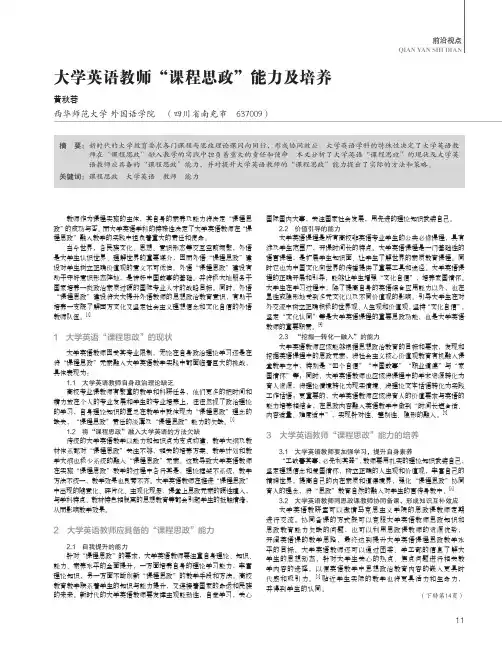
前沿视点QIAN YAN SHI DIAN 大学英语教师“课程思政”能力及培养黄秋蓉西华师范大学 外国语学院 (四川省南充市 637009)摘 要:新时代的大学教育要求各门课程与思政理论课同向同行,形成协同效应。
大学英语学科的特殊性决定了大学英语教师在“课程思政”融入教学的实践中担负着重大的责任和使命。
本文分析了大学英语“课程思政”的现状及大学英语教师应具备的“课程思政”能力,并对提升大学英语教师的“课程思政”能力提出了实际的方法和策略。
关键词:课程思政 大学英语 教师 能力教师作为课程实施的主体,其自身的素养及能力将决定“课程思政”的成功与否。
而大学英语学科的特殊性决定了大学英语教师在“课程思政”融入教学的实践中担负着重大的责任和使命。
当今世界,各民族文化、思想、意识形态等交互空前频繁,外语是大学生认识世界、理解世界的重要媒介,因而外语“课程思政”建设对学生树立正确价值观的意义不可低估。
外语“课程思政”建设有助于守好意识形态阵地,是讲好中国故事的基础。
并将极大地服务于国家培养一批政治素质过硬的国际专业人才的战略目标。
同时,外语“课程思政”建设将大大提升外语教师的思想政治教育意识,有助于培养一支既了解西方文化又坚定社会主义理想信念和文化自信的外语教师队伍。
[2]1 大学英语“课程思政”的现状大学英语教师因受其专业限制,无论在自身政治理论学习还是在将“课程思政”元素融入大学英语教学实践中都面临着巨大的挑战,具体表现为:1.1 大学英语教师自身政治理论缺乏高校专业课教师有繁重的教学和科研任务,他们更多的把时间和精力放在个人的专业发展和学生的专业培养上,往往忽视了政治理论的学习,自身理论知识的匮乏在教学中就体现为“课程思政”理念的缺失,“课程思政”责任的淡薄及“课程思政”能力的欠缺。
[3]1.2 将“课程思政”融入大学英语的方法欠缺传统的大学英语教学以能力和知识点为支点构建,教学大纲及教材体系都对“课程思政”关注不够,相关的培养方案、教学计划和教学大纲也极少系统的融入“课程思政”元素。
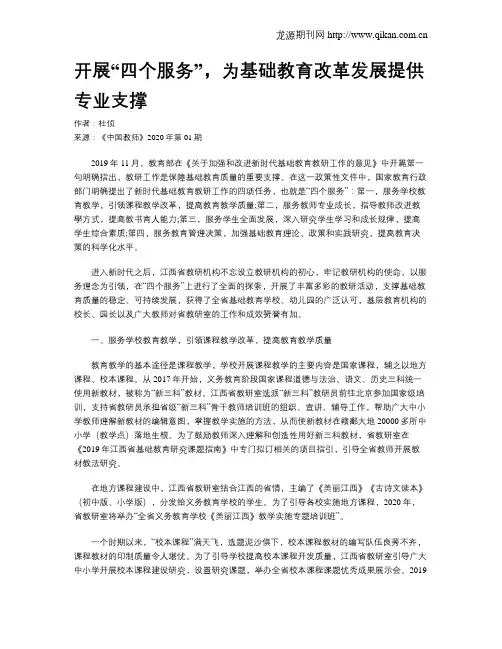
开展“四个服务”,为基础教育改革发展提供专业支撑作者:杜侦来源:《中国教师》2020年第01期2019年11月,教育部在《关于加强和改进新时代基础教育教研工作的意见》中开篇第一句明确指出,教研工作是保障基础教育质量的重要支撑。
在这一政策性文件中,国家教育行政部门明确提出了新时代基础教育教研工作的四项任务,也就是“四个服务”:第一,服务学校教育教学,引领课程教学改革,提高教育教学质量;第二,服务教师专业成长,指导教师改进教學方式,提高教书育人能力;第三,服务学生全面发展,深入研究学生学习和成长规律,提高学生综合素质;第四,服务教育管理决策,加强基础教育理论、政策和实践研究,提高教育决策的科学化水平。
进入新时代之后,江西省教研机构不忘设立教研机构的初心,牢记教研机构的使命,以服务理念为引领,在“四个服务”上进行了全面的探索,开展了丰富多彩的教研活动,支撑基础教育质量的稳定、可持续发展,获得了全省基础教育学校、幼儿园的广泛认可,基层教育机构的校长、园长以及广大教师对省教研室的工作和成效赞誉有加。
一、服务学校教育教学,引领课程教学改革,提高教育教学质量教育教学的基本途径是课程教学,学校开展课程教学的主要内容是国家课程,辅之以地方课程、校本课程。
从2017年开始,义务教育阶段国家课程道德与法治、语文、历史三科统一使用新教材,被称为“新三科”教材。
江西省教研室选派“新三科”教研员前往北京参加国家级培训,支持省教研员承担省级“新三科”骨干教师培训班的组织、宣讲、辅导工作,帮助广大中小学教师理解新教材的编辑意图,掌握教学实施的方法,从而使新教材在赣鄱大地20000多所中小学(教学点)落地生根。
为了鼓励教师深入理解和创造性用好新三科教材,省教研室在《2019年江西省基础教育研究课题指南》中专门拟订相关的项目指引,引导全省教师开展教材教法研究。
在地方课程建设中,江西省教研室结合江西的省情,主编了《美丽江西》《古诗文读本》(初中版、小学版),分发给义务教育学校的学生。
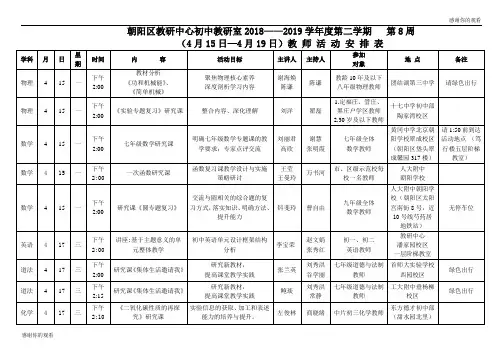
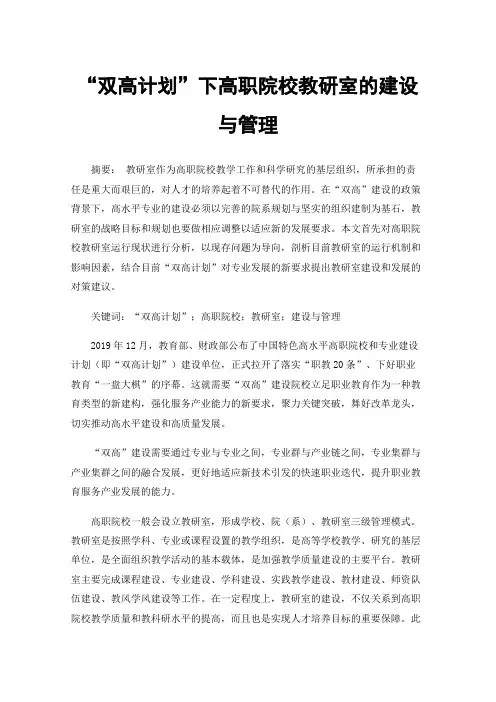
“双高计划”下高职院校教研室的建设与管理摘要:教研室作为高职院校教学工作和科学研究的基层组织,所承担的责任是重大而艰巨的,对人才的培养起着不可替代的作用。
在“双高”建设的政策背景下,高水平专业的建设必须以完善的院系规划与坚实的组织建制为基石,教研室的战略目标和规划也要做相应调整以适应新的发展要求。
本文首先对高职院校教研室运行现状进行分析,以现存问题为导向,剖析目前教研室的运行机制和影响因素,结合目前“双高计划”对专业发展的新要求提出教研室建设和发展的对策建议。
关键词:“双高计划”;高职院校;教研室;建设与管理2019年12月,教育部、财政部公布了中国特色高水平高职院校和专业建设计划(即“双高计划”)建设单位,正式拉开了落实“职教20条”、下好职业教育“一盘大棋”的序幕。
这就需要“双高”建设院校立足职业教育作为一种教育类型的新建构,强化服务产业能力的新要求,聚力关键突破,舞好改革龙头,切实推动高水平建设和高质量发展。
“双高”建设需要通过专业与专业之间,专业群与产业链之间,专业集群与产业集群之间的融合发展,更好地适应新技术引发的快速职业迭代,提升职业教育服务产业发展的能力。
高职院校一般会设立教研室,形成学校、院(系)、教研室三级管理模式。
教研室是按照学科、专业或课程设置的教学组织,是高等学校教学、研究的基层单位,是全面组织教学活动的基本载体,是加强教学质量建设的主要平台。
教研室主要完成课程建设、专业建设、学科建设、实践教学建设、教材建设、师资队伍建设、教风学风建设等工作。
在一定程度上,教研室的建设,不仅关系到高职院校教学质量和教科研水平的提高,而且也是实现人才培养目标的重要保障。
此外,教研室还是培养青年教师的“摇篮”,部分青年教师是毕业后直接走上工作岗位,教学经验不足、教学技能亟待提升,需要同专业经验丰富教师传、帮、带,教研室成员之间团结协作,有助于青年教师尽快站稳讲台。
专业教研室是按学科、专业而设置的基层教学和研究性的组织,在职业教育中,也是教学、科研以及学生实训指导相结合的教学研究机构。
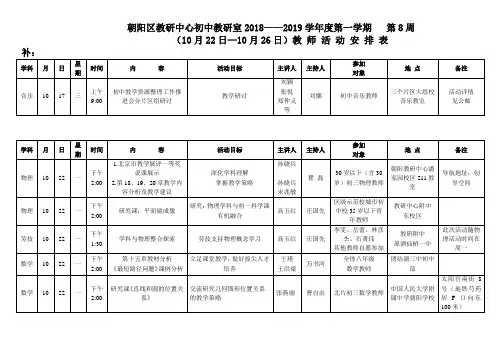

朝阳区教研中心初中教研室2018——2019学年度第一学期第6周(10月8日—10月12日)教师活动安排表
七年级数学参加对象名单:
于莲赵立伟刘丽君郝伟华侯金枝蒋君宝滕永生王美丽栾小萍杨晨雨王宏灼张桂芬郭小艳
梁潇李智铮许妍杨震寰张海芹李丽张蕾焦丽英刘珊孔丽丽万娟娟李爽张静
杨晓翠席彦青韩俊芳张艺然卫玉敏孟欣赵晴程桂田
刘运萍颜晓辰武向锦宗哲梁亚楠胡亚娇凌志超张彦伶
郝毅然胡悦王春英刘红文张明霞郭志斌陆春蕾
李岩周旋朱丽颖周芳
2018年秋季朝阳区部分英语骨干教师培训通知
各初中学校:
为进一步提升英语教师教学能力,探讨初中英语教学在课改背景下的发展方向和实施策略,朝阳区初中教研室英语组举办“中青年部分英语骨干教师培训班”。
请通知贵校老师准时参加。
培训时间:2018年9月28日—29日
培训地点: 平谷教工疗养院
活动内容: 1. 专题研讨
2. 命题培训
3. 目标检测编写
集合时间:2018年9月28日(周五)下午2:00
集合地点:东大桥三角地(集体坐车前往培训地点)
所带物品: 1. 带本年级英语教材及相关资料
2. 带本年级«朝阳区目标与检测»
3. 带身份证
4. 笔记本电脑
提示:如自行前往开会地点请提前告知本年级教研员
朝阳区教研中心初中教研室
英语组
2018. 9. 25
具体安排:。
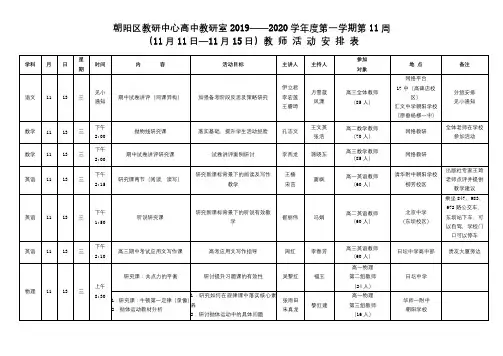
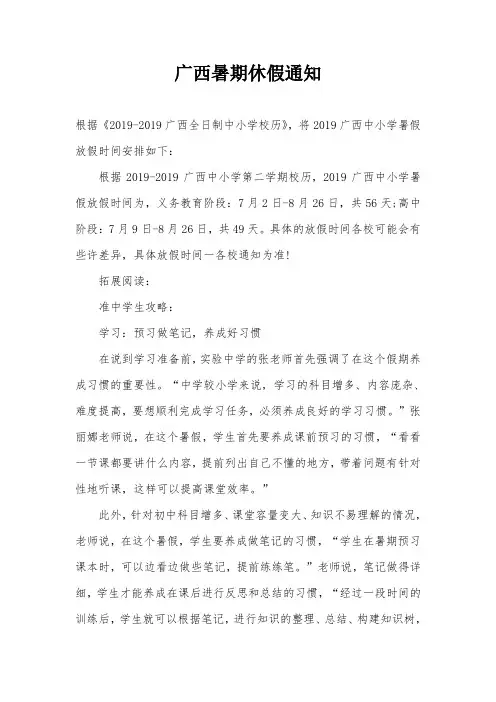
矿产资源开发利用方案编写内容要求及审查大纲
矿产资源开发利用方案编写内容要求及《矿产资源开发利用方案》审查大纲一、概述
㈠矿区位置、隶属关系和企业性质。
如为改扩建矿山, 应说明矿山现状、
特点及存在的主要问题。
㈡编制依据
(1简述项目前期工作进展情况及与有关方面对项目的意向性协议情况。
(2 列出开发利用方案编制所依据的主要基础性资料的名称。
如经储量管理部门认定的矿区地质勘探报告、选矿试验报告、加工利用试验报告、工程地质初评资料、矿区水文资料和供水资料等。
对改、扩建矿山应有生产实际资料, 如矿山总平面现状图、矿床开拓系统图、采场现状图和主要采选设备清单等。
二、矿产品需求现状和预测
㈠该矿产在国内需求情况和市场供应情况
1、矿产品现状及加工利用趋向。
2、国内近、远期的需求量及主要销向预测。
㈡产品价格分析
1、国内矿产品价格现状。
2、矿产品价格稳定性及变化趋势。
三、矿产资源概况
㈠矿区总体概况
1、矿区总体规划情况。
2、矿区矿产资源概况。
3、该设计与矿区总体开发的关系。
㈡该设计项目的资源概况
1、矿床地质及构造特征。
2、矿床开采技术条件及水文地质条件。
2019---2020(下)永宁中学教研室工作总结本学期虽然遭受“新冠肺炎”的影响,但在在石狮市教育局和进修学校的指导下,在蔡晓华校长和陈章维副校长的直接关怀下,教研室认真贯彻党的教育方针,依靠教研组长和广大教师,以教研为基础,以提升教师素质为重点,以课题研究为主线,加强常规管理,开拓进取,圆满完成各级布置的任务,使我校教科研水平和办学水平不断提高。
具体成绩如下:一、教学改革进一步深入,教科研工作取得可喜的成绩。
我校目前共有各级课题24个。
省级课题2个,县市级课题12个,校级微型课题10个。
本学期蔡晓华校长主持的福建省十三五规划2019年度课题《学本课堂教学模式的探索与实践》(课题编号FJJKXB19-879)有序推进中;吴明榕,黄文雅,梁何秀戴鹏章市级课题进入结题阶段。
广大教师认真撰写论文,本学期林海峰等老师的论文(共19篇)发表在CN刊物上。
教师技能比赛方面,李汉梁、蔡金枝老师参加泉州市中小学技术学科教师教学技能比赛,荣获泉州市二等奖;曾艺珍老师参加泉州市中小学心理健康教育优秀系列课参评,荣获泉州市三等奖;在2020年石狮中学作业设计评选活动中曾艺珍老师获市二等奖、郑栋梁、蔡培林老师获市三等奖;吴燕瑜老师的《三角函数的诱导公式》一课获得石狮级优质课。
二、教师教学水平的提高是教学质量提升的前提,教研室把教师的培训工作摆在重要的位置。
我校积极组织教师参加各类培训学习。
由于疫情影响本学期主要是以线上培训为主,先后有100多人次参加了各级的培训。
另外还有26人参加海峡培训平台的继续教育课程。
此外,各教研组重视对青年教师的“传帮带”工作,本年度共有72对“师徒”结对帮扶。
三、教学常规工作有条不紊,学校教研渐成风气。
在疫情防控期间,为消减延迟开学带来的影响,学校和教研室要求各教研组、备课组结合在线学习工作安排,落实好下面的内容:1、各教研组长制订新学期教研组工作计划;通过微信群内召开组会(可语音通话),组织各备课组有效选择、整合学科资源,把在线学习的重点放在学科资源的有效使用上,重在线上针对上学期所学知识点的补缺和作业等的答疑上;工作中遇到的问题及时反馈。
[摘要]大学英语是我国高校的一门针对本科一、二年级非英语专业学生的公共必修课,上课模式一般为大班教学。
学生数量多、课堂操控难度大,是大学英语大班教学的特点,这就要求教师对传统教学模式进行改革和创新,以最大限度地适应大班教学的需要。
因此,基于上述背景,在总结大学英语大班教学现状的基础上,提出了相对应的课堂教学方式,以期为高校大学英语教师的大班教学方式提供借鉴。
[关键词]高校;大学英语;大班教学;教学方式[中图分类号]H319[文献标志码]A[文章编号]2096-0603(2021)11-0058-02大学英语大班教学的现状及课堂教学方式探讨①侯雨辰1,马凯昱2(1.阜阳师范大学信息工程学院外语系,安徽阜阳236041;2.阜阳师范大学外国语学院,安徽阜阳236041)一、引言所谓“大班”,是指在班级里拥有较多数量学生的一种课堂组织方式,而对于“大班”具体是指多少人数的班级,现在并没有一个确切的定论[1]。
大部分教育学家认为,人数超过50的班级就可以被称为“大班”[2]。
目前,在我国高校,大学英语作为一门全校非英语专业的大一、大二学生必修的公共课,为解决学生数量多、师资力量紧张等问题,绝大部分的大学英语课堂采取了两个班级甚至三个班级的合班教学。
这种把几个小班合并成一个大班进行的英语教学对于教师和学生都是一个挑战,如教师课堂角色单一和学生英语基础不一等。
因此,根据高校大学英语大班教学的现实情况,亟须开展多样化、高效的课堂教学方式,以解决大班教学课堂模式存在的现实问题。
二、大学英语大班教学的现状(一)教师强化主导课堂目前,我国高校大学英语的课堂中仍然采取教师主讲、学生记忆的传统教学方式,学生通过教师对知识点的讲解来获取新知识,然而这种做法却忽略了英语作为一门语言的交流性和实用性。
调查显示,在某高校的378名本科二年级学生的“英语大班教学的教学方式”问卷调查中,有346位学生(占91.53%)选择了“单一讲授法”,甚至有学生还在问卷调查最后的发言栏中表示在大学英语的课堂中几乎没有师生互动,学生只是枯燥地听讲和记笔记[3]。
大学英语教研室暑期工作安排
总体工作安排
为跟上学院快节奏的建设步伐,实现弯道超车,教研室计划利用
暑期开展新任教师及青年教师培训、课程考核演练、备课、编写考研
辅导书、推进课程建设、外研社暑期教师培训、四六级及考研英语真
题研究等工作。
具体工作内容
1. 利用寒假至新学期开学前这段时间,采用个人备课和集体备课相
结合的方式,要求教师备课个单元,即一个学期的任务,内容包括、
教案、作业设计、习题设计;
2. 举办教情交流座谈会,由教研室主任和小组长介绍情况、提出要
求、提供参考模板、提供部分资源;
3. 组织课程考核演练,利用老教师课程演练的机会,青年教师必须
参与观摩学习;
4. 组织集体备课,有计划安排单元主备人和示范主讲人,穿插青年
教师教学演练;
5. 月底编写完毕读写译(第一册)考研辅导书和视听说(第一册)
四六级辅导书;
6. 推进课程建设完成第一阶段建设目标;
7. 成立四六级与考研英语真题研究小组,于假期进行专项研究;
8. 月底接受学院四六级考研真题测试。
9. 新任教师教学演练即岗前试课。
人文学院大学外语教研室
附:具体时间安排
序号 工作内容 时间 参与人员 召集人 地点 备注
暑期工作部署动员会 全体 教研主任 完成
教情交流座谈会 全体 教研主任 完成
四六级考研辅导书编委会 编委 责编 完成
课程建设推进会() 课建成员 课建负责人 完成
四六级与考研英语辅导研讨会() 研会成员 教研副主任 研会负责人 完成
考核演练() 全体 教研主任 待定
集体备课及教学演练() 全体 课程组长 待定
考研辅导书编委会() 编委 责编 待定
课程建设推进会() 课建成员 课建负责人 待定
考核演练() 全体 教研主任 待定
集体备课及教学演练() 全体 课程组长 待定
四六级考研辅导书编委会 编委 责编 待定
四六级与考研英语辅导研讨会() 研会成员 教研副主任 研会负责人 待定
考核演练() 全体 教研主任 待定
集体备课及教学演练() 全体 课程组长 待定
外研社暑期师培 待定 教研副主任 待定
新任教师岗前试课 全体 教研主任 待定